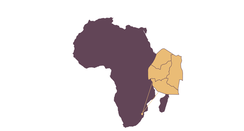Integrating the Response to GBV, Human Immunodeficiency Virus (HIV), and Economic Marginalization of Swati Women
|
Beginning in 2020, Integrating the Response to GBV, Human Immunodeficiency Virus (HIV), and Economic Marginalization of Swati Women is a multi-phased program working at the intersection of GBV and WEE in Eswatini. WAGE works strategically with CSO, government, and private sector partners across three core pillars: access to justice, prevention, and protection, with a focus on legal reform, holistic service provision, and addressing harmful gender norms with key populations. The program ensures that economic strengthening (ES) programs do not result in GBV or other unintended consequences for women beneficiaries. WAGE Eswatini is led by ABA ROLI with WEE technical expertise from Grameen Foundation.
|
READ MORE
Phase I (2020 – 2021): WAGE engaged with local stakeholders on legal reform priorities and advocated for improved access to legal aid for Swati women at risk of or affected by GBV and HIV. WAGE also prioritized support to local partners through training on harmful gender norms and the provision of small grants to conduct community outreach and education on gender equality. Additionally, WAGE established facilitated connections between gender-focused CSOs to improve GBV service coordination.
Phase II (2021-2022): Building on lessons learned and momentum from Phase I, WAGE is continuing to advocate for improved laws to protect Swati women and educate lawyers, CSOs, government actors, and the private sector about the importance of legal reform and legal aid in Eswatini. WAGE is also continuing to build CSO capacity on GBV and WEE integration, raise community awareness on gender equality, and improve care for GBV survivors.
Three of the program's goals are:
- Strengthen the collective capacity of CSOs, first responders, service providers, and lawyers to improve legal protections for women affected by or at risk of GBV and HIV.
- Promote effective GBV prevention strategies.
- Provide holistic services to economically active women, including referrals to GBV survivors.
Phase II (2021-2022): Building on lessons learned and momentum from Phase I, WAGE is continuing to advocate for improved laws to protect Swati women and educate lawyers, CSOs, government actors, and the private sector about the importance of legal reform and legal aid in Eswatini. WAGE is also continuing to build CSO capacity on GBV and WEE integration, raise community awareness on gender equality, and improve care for GBV survivors.
Three of the program's goals are:
- Strengthen the collective capacity of CSOs, first responders, service providers, and lawyers to improve legal protections for women affected by or at risk of GBV and HIV.
- Promote effective GBV prevention strategies.
- Provide holistic services to economically active women, including referrals to GBV survivors.
LEAD IMPLEMENTERS
Updates
Integrated Approaches to GBV Prevention in Eswatini during COVID-19
READ MORE
READ MORE


